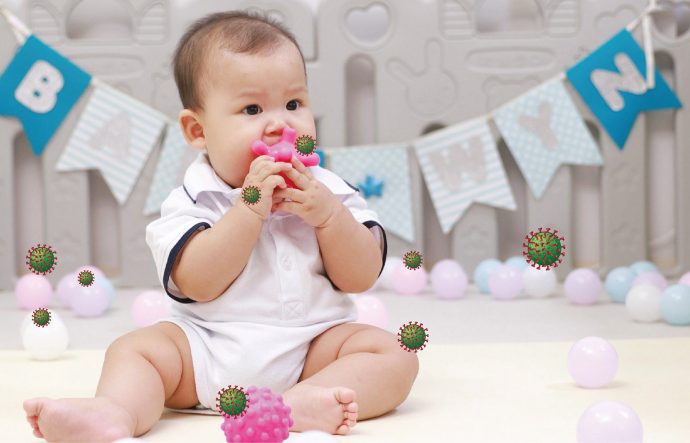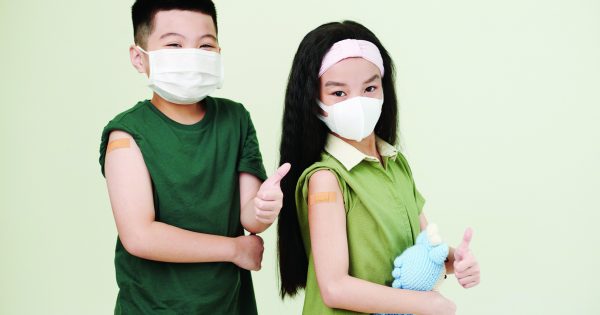We all know that good hygiene is crucial for preventing most diseases. However, in the case of rotavirus infections, good hygiene sufficient or effective alone may not be enough.
Rotavirus contamination can happen easily – just one person within your social circle who has rotavirus can spread the disease to others. A study in a day care setting found live rotavirus samples on the third day on several frequently-touched surfaces near the diapering area (i.e. sink, diaper pail lid, and fridge handle) and also on the caregiver’s hands. The home environment faces the same problem. The rotavirus is robust and resistant against some of the cleaning agents.
Clean, but not clean enough
Contamination can happen as normal handwashing with soap and water is less effective against rotavirus, as compared to alcohol-based hand sanitisers. Unfortunately, this is not a normal handwashing routine and so it is possible to contaminate objects/surfaces by touch, e.g. light switches, door knobs, TV remote, handphones, keys, cups, plates, cutlery… well, you get the idea.
This makes it easy for the rotavirus to spread to other people. Worse, the rotavirus is hardy enough to survive on dry surfaces for up to two months! Infants and toddlers tend to be more susceptible because they have a habit of placing their hands/fingers and other objects into their mouth. As their immune systems are still immature, they will be more seriously affected by rotavirus infections.
The World Health Organization estimates that rotavirus is responsible for the deaths of over 215,000 children under 5 years of age globally in 2013. Rotavirus outbreaks have also occurred in Malaysia, with the most recent in Sabah last year.
A not-so-obvious sign
The common signs and symptoms for rotavirus include severe diarrhoea, vomiting, fever and abdominal pain. As these symptoms are shared by many other illnesses, parents may not suspect rotavirus at all.
Dehydration can be deadly
Severe diarrhoea and/or vomiting in infants and young children can easily cause dehydration. They may need to be hospitalised and/or placed on an intravenous drip to keep them hydrated. Severe dehydration can be life-threatening so don’t delay in seeking medical attention.
The delay in diagnosing rotavirus allows more time for greater home contamination, as additional precautions are unlikely to be taken beforehand. Siblings at home face the risk of infection from contaminated objects/ surfaces. Visitors also risk picking up the virus and taking it home, thus unwittingly infecting their children.
A typical scenario of how contamination happens
- Your infant has diarrhoea and soils his diapers. It may leak, contaminating clothing, bedding, and/or toys.
- Handling diapers or soiled things means getting the virus on your hands. Not disinfecting your hands leads to further contamination by touch, e.g. laundry basket, washing machine, etc.
- Soiled clothing, bedding, or toys that are improperly disinfected are sources of further contamination and/or subsequent reinfection.
- This leads to frequent bouts of “unexplained” diarrhoea, which perpetuate the cycle.
How do you stop the contamination?
Hands: In addition to washing with soap and water, use alcohol-based hand sanitiser immediately after handling any diarrhoeal matters (diapers, soiled clothes, etc.)
Potentially contaminated surfaces: Use chlorine-based disinfectants (e.g. chlorine bleach) to wash surfaces. Mix according to the manufacturer’s instructions and take your time when wiping (to give it time to kill germs or viruses). Allow for ventilation during/after wiping to prevent breathing excess fumes.
Soiled items: Wash them separately and always handle them carefully. Add chlorine bleach solution to your wash and wear rubber gloves if washing by hand. Wash/ disinfect the gloves after use.
Protect your bed: Use bedliners to prevent diaper leaks soaking the bed. Wash soiled bedliners separately with chlorine bleach solution. Badly contaminated bedliners should be disposed of with care to prevent contaminating other items.
Note: Chlorine bleach is unsuitable for certain materials (e.g. wool, silk, etc) and can permanently damage dyed fabrics.
Learning how to prevent the spread of rotavirus is important, but just like any disease, prevention is the best cure. You can get your child vaccinated against rotavirus from as young as 2 months, so check with your paediatrician if you have not vaccinated him yet.
An educational contribution by Malaysian Paediatric Association.








Comments